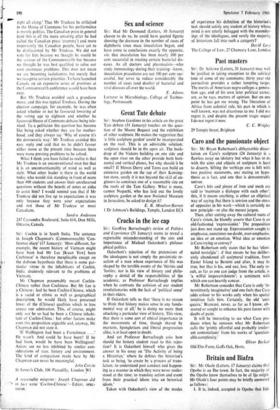Cracks in the ice cap
Sir: Geoffrey Barraclough's review of Politics and Experience (31 January) seems to reveal a regrettable misunderstanding of the aim and importance of Michael Oakeshott's philoso- phical politics.
Oakeshott's rejection of the pretensions of the ideologues is not simply the pessimistic re- action of a man whose experience of life was shaped by the terrible events of the 'thirties and 'forties; nor is his view of history and philo- sophy a denial of the responsibilities of the academic, as Professor Barraclough implies when he contrasts the activism of our student revolutionaries with the lack of 'political sense' in their elders.
If Oakeshott tells us that 'there is no reason to think that history makes sense in any funda- mental way at all,' he is doing no more than attacking a particular view of history. This view, that there is some sort of ethical importance in the movements of time, though shared by marxists, Speng,lerians and liberal progressives alike, is at least open to doubt.
And yet Professor Barraclough asks how should the history student react to this rejec- tion? It is Oakeshott himself who gives the answer in his essay on 'The Activity of being a Historian,' where he defines the historian's task as being, 'to create by a process of trans- lation; to understand past oonduct and happen- ing in a manner in which they were never under- stood at the time; to translate action and-event from their practical idiom into an historical idiom.'
Taken with Oakeshott's view of the modes of experience his definition of the historian's task should satisfy any student of history whose mind is not utterly befogged with the maunder- ings of the ideologues, and surely the majority of historians fall into such a category?
David Levy The College of Law, 27 Chancery Lane, London






































 Previous page
Previous page